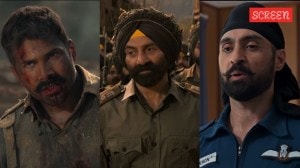Reeking Ramayana
Ashok Banker's third Ramayana book The Demons of Chitrakoot is out and some of my colleagues were discussing it the other day. My own view...

Ashok Banker8217;s third Ramayana book The Demons of Chitrakoot is out and some of my colleagues were discussing it the other day. My own view, after having raved about the first book for its freshness and fantasy, was that neither the second book nor the third can match the first because everything goes by the rules of western fantasy, one colleague said it was Tolkien8217;s influence, another said it was J.K. Rowling8217;s. Whatever, it8217;s far too creepy. Western fantasy demands a rigid binary position, like its earliest morality plays. Good is unvarnished chrome, Evil is humongously hideous and lacks all subtlety, every carbuncle oozing livid green pus and every reeking fang festooned with shreds of rotting flesh torn from innocent victims. Not that Indian literature doesn8217;t do a nice line in evil creatures .
But the Hindu approach to Avatar is not terrified, it8217;s ecstatic and celebratory, even amidst the pleas and prostrations. So Banker8217;s story is neither uplifting nor terrifying: it is tiresomely repetitive. A pall of gloom hangs over the tale and turns it from the beloved tale of our childhood to an angst-ridden adult8217;s insistence on being as ugly and wretched as human imagination can furnish. Which brings us to another civilisational point. Sanskrit drama insists on a happy ending, at stopping the narrative at a hope point in the protagonist8217;s life, no matter how many dreadful things happen before. This convention aims to send the audience home with a life-affirmed feeling. The process differs from that of ancient Greek drama, which is supposed to flush out your emotional toxins by flooding you with pity and terror catharsis. That, reduced, is basically why the west likes unhappy endings and we like happy ones, though the west supposes it is more evolved and 8220;grown up8221; for it.
But consider this. The People of the Book need the certainty of Creation 8220;On the first day God did this8221; and the sense of direction engendered by a theology that marches in a straight line from Creation to Judgment Day. Which is more 8220;grown up8221;? The comforting certainty that they anchor their minds to, or the infinite Chaos and endless time cycles that even deracinated Hindus and Buddhists seem to know?
At day8217;s end, each worldview is right for those who adhere to it sincerely. Bathing all these seemingly diverse views is the One Grace that reveals itself to different peoples as it chooses in its lila. But to intrude 8216;that8217; into 8216;this8217; without appropriate nuancing can make you ill, as in Banker8217;s Ramayana. Besides, aren8217;t real life news stories evil already without needing to feed on fantasy? Give me back the Rama I love to hate for dumping Sita, without crowding the canvas with comic book yuckies.
- 01
- 02
- 03
- 04
- 05































